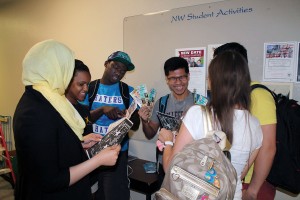
By Elyssa Whaley and Cody Daniels
Many students miss out on the simple little things that could make a huge difference in accomplishing their educational goals.
Thomas Roanne began attending NE Campus right after graduating high school in 2011 and found out what he had been doing wasn’t enough.
“I fooled myself into thinking it would be a breeze and that I could act the same [as in high school] because of the core curriculum and remedial courses I had to take,” he said. “It wasn’t an entire new year later that I realized I needed to exercise stronger willpower.”
TR counselor Lori Leach said she notices a few issues pop up every semester with students, such as managing time and adjusting to different class requirements.
“Getting familiar with Blackboard and finding classes can be stressful,” she said. “Students often feel a little anxious getting used to new routines.”
This is a normal feeling when students don’t know what to expect, Leach said.
Stephen Griffin, South Campus assistant professor of economics and management, said he sees students who struggle because of their lack of experience.
“A lot of students didn’t learn useful study skills in high school and haven’t developed any while in college,” he said.
Griffin believes students struggle because too many students work too many hours for the number of college courses they are taking.
Leach said she sees many overwhelmed students who struggle with how to communicate with professors. She said it’s important at the beginning of the semester to voice concerns, ask questions and get organized.
NE student Macy Thurwachter said she finds it simple to communicate with instructors.
“Just tell them, ‘Hello, professor [insert name], my name is [insert name],’ and ask them any questions you have on the first day or just say something nice,” she said.
Thurwachter said if a conflict arises, students should talk with that instructor directly before contacting the department chair.
“I cannot stress enough how important effective communication is with your instructor,” she said. “They are here to help you succeed. If you need assistance or are falling behind, talk with them!”
Griffin said the first order of business each semester is to review the syllabus and all of the resources available.
“Make sure you understand how the course is structured and that you understand the grading system,” he said. “That should clear up a lot of misunderstandings. If not, talk to your instructor.”
Paula Vastine, NE director of student development services, said attendance is imperative the first week of school.
“Instructors give out valuable information and tips to help students succeed,” she said.
Thurwachter agreed and said the first day is the most important day.
“The first day is when you have the opportunity to meet your teacher,” she said. “Ask any questions you have about textbooks as well the class syllabus.”
Vastine also encouraged school participation as a fruitful component of college life.
“Research has shown that students who take advantage of the school services and extracurricular opportunities are more successful,” she said. “Each campus has a student guide that details many of the services on campus.”
Thurwachter said she has enjoyed participating in school clubs and having the ability to impact others within TCC.
“Getting involved within at least one club or organization makes your college experience more enjoyable,” she said.
Leach said she notices many students experience test anxiety and encourages them to address it early on.
“The [TR] Discover Center offers a seminar on this topic and counselors can help too,” she said. “Stress also needs to be addressed.”
Leach said one of the most common reasons students don’t do well is because they overextend themselves with their courseload. Her suggestion for students to have a strong semester is to eat healthy, exercise and surround themselves with supportive friends and classmates.
She wants students to be realistic about how much time they have to dedicate to school.
“Telling yourself that ‘I’ll study as soon as I have time’ can be a big problem,” Leach said. “You won’t be able to do it.”
NE music and arts student Jake Wilson, who described himself as “slightly lazy,” said he needed a push from his parents to attend class, and now he’s grateful for that.
“Someone always had to wake me up or provide me that little extra bit of motivation,” Wilson said. “Now, I really think that students with my tendencies or minor procrastination habits need awareness.”



























